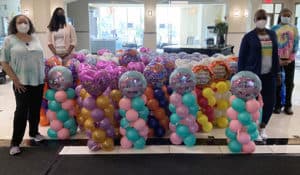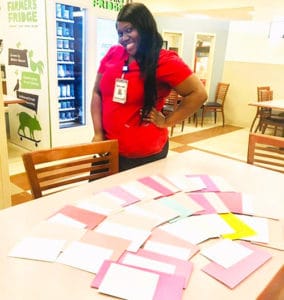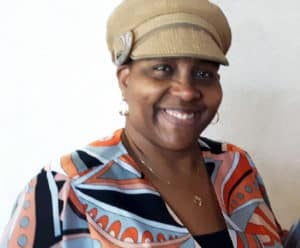Simple Idea of Gratitude Creates Long-Term Health Outcomes at Advocate Trinity Hospital

In 2019, the Rev. Dr. Gloria Brown, senior staff chaplain at Advocate Trinity Hospital in Chicago, planted the seed of an idea during an Advocate Partners of Faith and Health Network (PFHN) meeting: Why not keep daily journals, writing down something for which they were grateful each day? Brown’s colleague, Patricia A. Jackson, CHW, with Advocate Community Health Department, watered that seed, says Brown, and the Gratitude Jar and Gratitude Room were born.
Of course, “little did we know that we would have to develop hearts of gratitude to endure 2020,” Brown adds. “It’s much easier to have an attitude of gratitude when things are going smoothly. [But] no matter what went on in 2020, daily, we had something to be grateful for.”
The Advocate Partners for Faith and Health Network brings together leaders of all faith groups, community members and people in the health field. Its goal is to work together to advocate and promote lifestyles and activities that prevent and/or support the management of chronic disease in their community. They officially kicked off the Gratitude Jar Project in January 2020.

Project participants reflected on the things for which they were grateful. It could be an experience, a loved one, a co-worker they appreciate … there were no limits. Each day, participants wrote down their blessings and placed them in their jar. Last December, they gathered to share their gratitude messages and discuss how being grateful has had a positive impact on their lives. Because of the pandemic, the meeting was held via Zoom.
Among the many benefits of gratitude are improving sleep quality, decreasing blood pressure, increasing energy levels, reducing stress. Studies show that showing and articulating gratitude can produce these health benefits.
This year, the Gratitude Project has become an ongoing Gratitude Room on Zoom. Participants gather the second and fourth Monday of each month at 3 p.m. CT to learn about the benefits of gratitude, support one another and pray together, share ideas on living a more grateful life, and enjoy one-on-one conversations on a variety of gratitude-related topics.
The Zoom Gratitude Room also participated in a special Mother’s Day Card Project, collecting cards to show the women in their community how much they are loved and appreciated. With a goal of collecting 100 cards, the project collected more than 700 cards, thanks especially to Lashondria Purnell, Advocate faith nurse, who worked hard with both Advocate and its community partners to collect the cards. The cards were then delivered to women at risk for social isolation. Other PFHN members brought the Gratitude Jar Project to their local congregations.

One participant, Floretta Strong-Pulley, embraced the Gratitude Jar, but took it one step further. Strong-Pulley, who has diabetes and is undergoing maintenance chemotherapy, created a “Gratitude Bucket List.” She writes down her blessings and goals on clothespins and attaches them to a blue bucket. As she achieves a goal, she drops that clothespin into the bucket. Some of her goals have included exercising, losing weight, walking in the park, and working around the house.
“I’m having a ball,” she says. “The project has helped me focus on my goals and remind me of my blessings.”
In February, Advocate’s Partners of Faith and Health Network received the Award of Impact by Black Health Matters during its Virtual Summit. The award, accepted by Jackson, cited the Gratitude Jar Project’s ability to keep people connected during the pandemic.
The Gratitude Project, in all its forms, continues to thrive. This month, the Gratitude Room is collecting socks for veterans, which will be distributed at a special Veteran’s Father’s Day BBQ Outdoor Festival June 19 at Healing Temple Church in Chicago.
Reflecting on the project, Jackson says she has witnessed how the positive attitude created by a project like the Gratitude Jar can have an impact on diseases, and on how participants handle situations.
“Every day, they can look at the jar,” says Jackson. “They can put something in it for which they are thankful. It makes them feel happy.”
Join Our Mailing LIst
"*" indicates required fields
